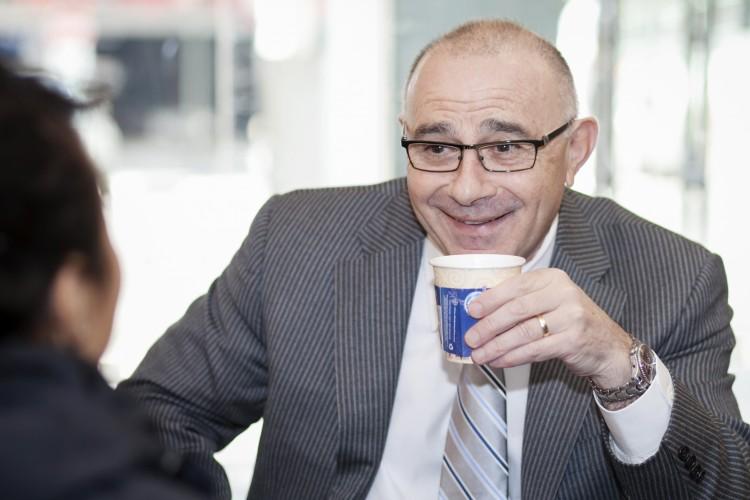NEW YORK—Despite working around a tight campaign schedule, mayoral candidate Sal Albanese, 63, took the time to talk about his schizophrenic father, his invitation to try out for the Yankees, and other aspects of his personal life.
His communications director chipped in from time to time to steer the conversation toward Albanese’s policy of not accepting money from special interests groups, but Albanese did not follow the drift. He was just one human having a conversation with another.
Albanese emigrated from Italy to Brooklyn on a ship in 1957, after a seven-day excursion across the ocean. He and another boy greased the leg bottoms of chairs to pass the time.
“They were sliding all over the place. The captain was furious and my mother had to rein me in,” he recalled, chuckling softly.
After years of separation, he and his family were coming to the United States to reunite with his father, who was a police officer in New York at the time, and prior to that a prisoner of war in Italy.
But shortly after their arrival his father became ill with schizophrenia.
Due to the language barrier, they were unsure of where to seek treatment.
It wasn’t until Albanese entered adulthood that he and his sister were able to get help. They scheduled a meeting with the only Italian-speaking assemblyman at the time, and current Kings County Appellate Judge Michael Pesce.
The former assemblyman had Saturday constituent hours.
“He found us an Italian-speaking psychiatrist,” Albanese said. “So when I became a council member I never forgot that experience.”
“I made sure that when people came to our office they received the same kind of attention and help that I got when Pesce helped my family,” he said.
City Council
Albanese was a public school teacher for 11 years in low-income neighborhoods such as Sunset Park, Brooklyn, where he taught a special class for students with troubled backgrounds.
“There were a lot of youth gangs. ... I went to quite a few funerals on Sunset Park,” he said. “I worked with kids who had significant issues in tough areas of the city... all of them could have been taught.”
In hopes of effecting change, Albanese served on Community School Board 20 in the 1980s.
“When I started interacting with officials I felt that half of them were useless,” he said. “They’re not focusing on the issue.”
Hence, Albanese ran for council member on the independent democrat ticket. He defeated Republican incumbent Angelo Arculeo, who had held the office for over two decades in a district that was largely Republican at the time.
Albanese was a member of City Council from 1982 to 1998. He is remembered for passing the New York City Living Wage Bill despite Mayor Giuliani’s disapproval in 1996, which raised the minimum wage in the city. Albanese was also the original sponsor for the Campaign Finance Reform Bill.
He boasts of never accepting a stipend from the speaker during his tenure as council member.
“When a council member gets an additional $7,000–10,000 a year, they give up their core values and beliefs,” Albanese said. “I remember one of my colleagues telling me ‘I love your vote on this but I can’t do it because he wants me to vote this way and I have to pay my mortgage.’”
Multitasking
Albanese has a remarkable ability to complete multiple daunting tasks at once.
While teaching at John Jay High School, Albanese earned his master’s degree in health from New York University, finishing in 1976.
He began his for his doctorate while he was teaching, but could not complete it because he became involved in local politics on the school board.
While in office as a council member, Albanese simultaneously earned a Juris Doctor from Brooklyn Law School in 1990. He used to wake up at 4 a.m. to read case laws.
“I passed the bar the first time,” Albanese said, adding for effect: “John Kennedy Jr. was sitting next to me. He failed it three times, poor guy.”
“I tell you he was a very handsome man. At lunch time ... cameras are everywhere taking pictures of him and women are all over him,” he said. “No wonder the guy was totally distracted.”
Despite his achievements in academia, learning was not his primary interest growing up.
Albanese grew up in Park Slope, Brooklyn, when it was a working class neighborhood. He recalled seeing people sniff glue bags as he walked down the street. His mother fed the family by working in the garment industry.
“You had to be either a good athlete or a gang member to be anybody,” he recalled. So Albanese played baseball.
“One of the things that kept me in school [when I was younger] was that I had to pass three subjects to stay on the baseball team,” he said.
Albanese got so good at baseball that he was invited to try out for the Yankees. He wasn’t selected, but it remains a great memory.
“That was one of the highlights of my life. It was such a great experience, putting the uniform on, feeling the ball there ... at the Yankee Stadium,” he said.
“But, at a certain point in time you grow up, you realize that learning is so important to all aspects of life,” he said. “That’s when I went for [a] master’s degree at NYU.”
Third Time’s the Charm
It is technically Albanese’s third campaign for mayor, but he insists it is his second time because he pulled out in 2001 as it became unfeasible for him to run a part-time mayoral campaign.
“I had two daughters in college and I realized it was virtually impossible to work and raise money for mayor so I terminated that campaign,” he said.
For the past 15 years, Albanese has been working in the private sector, particularly in the legal and financial field. For the last nine years, he worked for Mesirow Financial where he was the managing director. But he left it all to run for mayor.
“I left a pretty high paying job. I’m not looking for a job, I’m looking to make a difference,” he said.
Although Albanese said he isn’t accepting money from lobbyists, he is confident money will not be an issue this time. “Our contributions are from New Yorkers who are interested in good government,” he said.
And on top of that, Albanese isn’t paying attention to the poll issues.
“It’s a cynical political process,” he said. “Sometimes you’re not addressing the real issues.”
Albanese said he’s going to address issues he feels are important, even if it’s not what people are talking about right now.
For example, Albanese plans on implementing early education programs for children as young as two months in low-income areas.
Throughout the years, Albanese hasn’t forgotten the funerals he attended at Sunset Park. “All of them could have been productive citizens,” he said. “We need to start giving support from a young age.”




